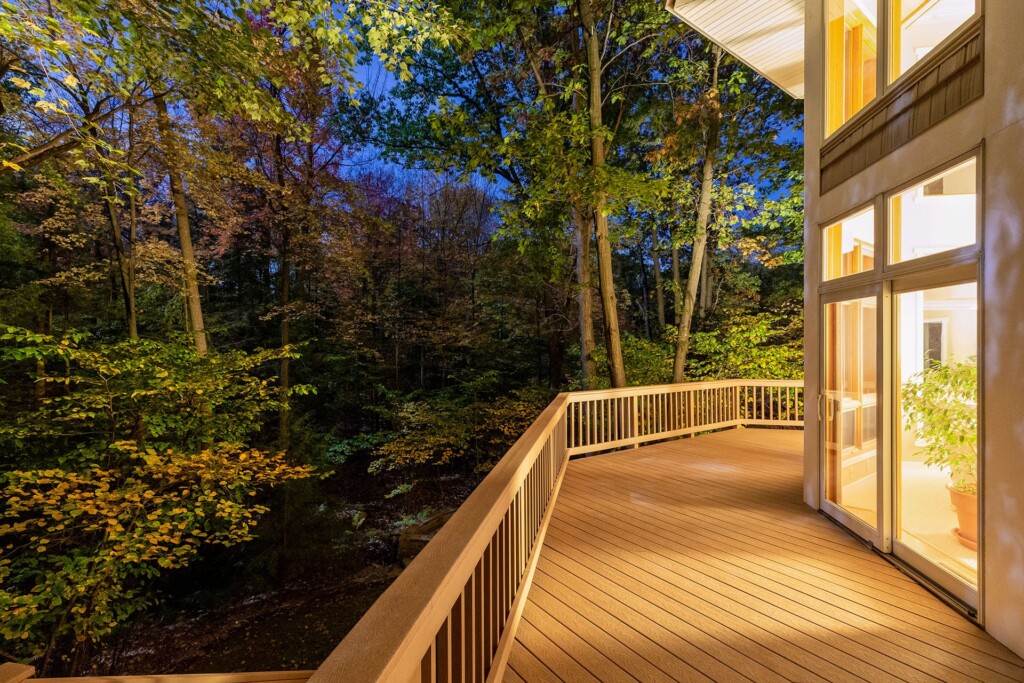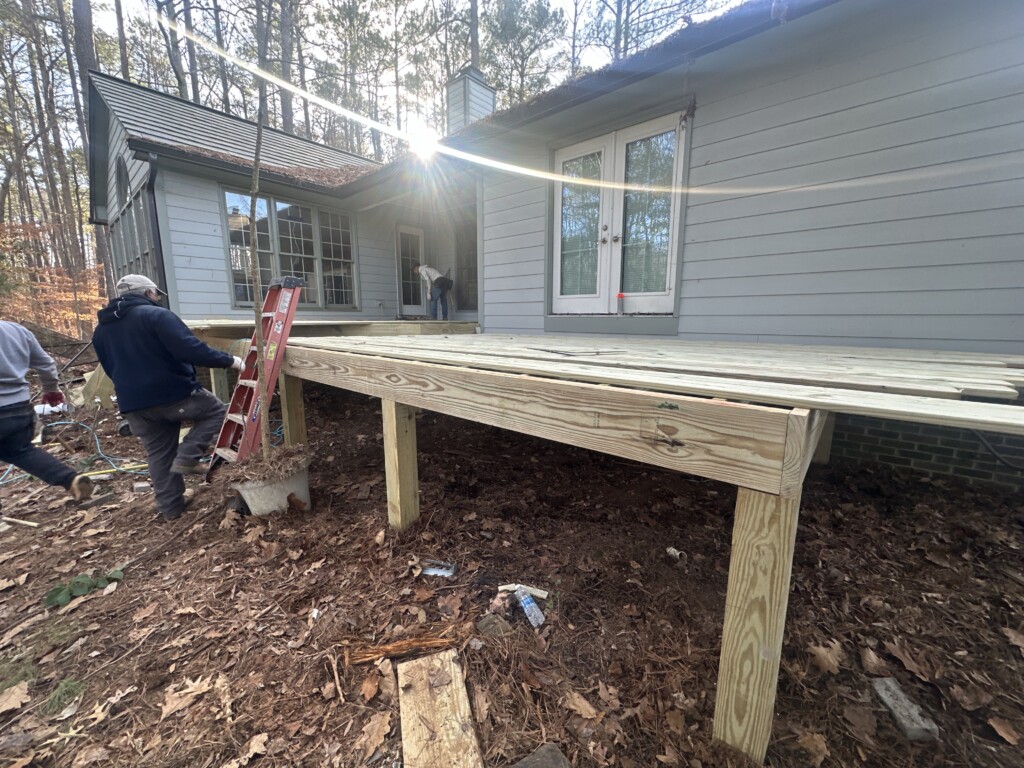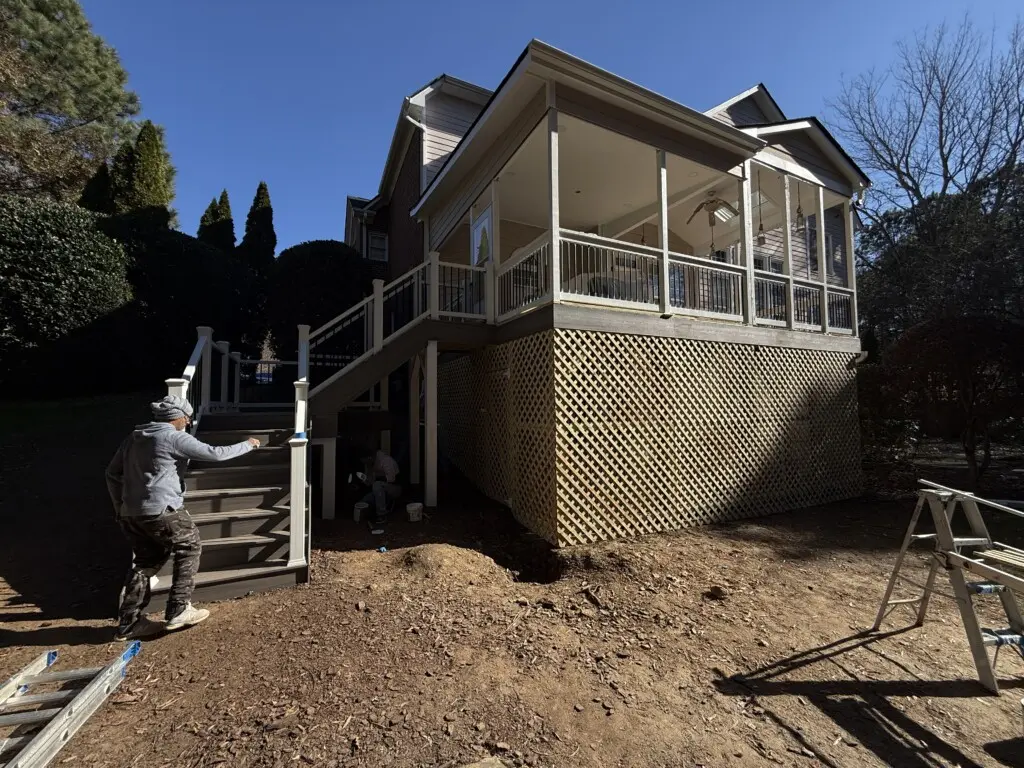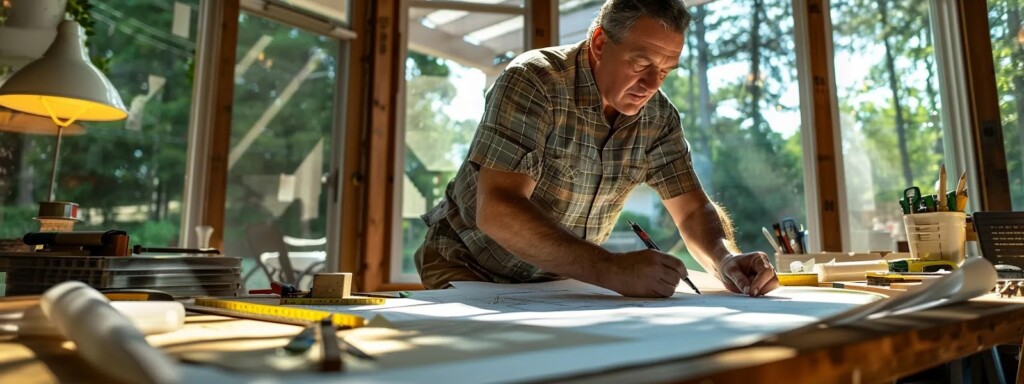Building a deck is one of the most rewarding home improvement projects you can undertake, transforming your outdoor space into a beautiful extension of your home. However, choosing the right deck builder in Northwest Raleigh can make the difference between a stunning addition that enhances your property value and a costly headache that leaves you disappointed. For homeowners in Northwest Raleigh, this decision carries even more weight due to unique local considerations, including specific building codes, climate challenges, and neighborhood aesthetics.
This area presents distinct opportunities and challenges for deck construction. From the Prairie Road Ecosystem’s natural beauty to the established neighborhoods along Edwards Mill Road and the developing areas near Reedy Creek Road, the mix of mature communities and new developments means builders must navigate varying HOA requirements. North Carolina’s humid subtropical climate demands materials and construction techniques that can withstand significant temperature fluctuations, heavy rainfall, and occasional severe weather. Additionally, the region’s clay soil conditions can impact foundation work and drainage considerations for deck installations.
To help you make an informed decision and ensure your deck project exceeds expectations, here are the essential questions every area homeowner should ask potential deck builders.
10 Questions to Ask Before Hiring a Deck Builder
1. What Experience Do You Have With Decks in Northwest Raleigh?

Local experience matters tremendously when it comes to deck construction. This area’s unique climate patterns, soil conditions, and building requirements create specific challenges that experienced local builders know how to navigate effectively.
A seasoned local deck builder will understand the region’s heavy clay soil and how it affects drainage around deck foundations. They’ll be familiar with the area’s frequent summer thunderstorms and know which materials and construction techniques best withstand high humidity and occasional severe weather. Most importantly, they’ll have established relationships with local suppliers, inspectors, and permitting offices, which can streamline your project timeline.
Ask potential builders for specific examples of recent projects in neighborhoods along Edwards Mill Road, near Reedy Creek Road, or around the Prairie Road Ecosystem area. Request details about challenges they encountered and how they addressed them. A builder with genuine local experience will be able to discuss specific neighborhoods like North Hills and Crabtree Valley, common soil issues they’ve encountered, and how they’ve adapted their construction methods to local conditions.
2. Are You Licensed and Insured?

This question is non-negotiable and should be among the first things you verify with any potential deck builder. In North Carolina, contractors performing work valued over $30,000 must hold a general contractor’s license, while smaller projects may require specific specialty licenses depending on the scope of work.
Your deck builder should carry both general liability insurance and workers’ compensation insurance. General liability protects you if someone is injured on your property during construction or if your property is damaged during the project. Workers’ compensation ensures that if a worker is injured on your property, you won’t be held liable for medical expenses or lost wages.
Don’t simply take their word for it – ask to see current certificates of insurance and verify the license number with the North Carolina Licensing Board for General Contractors. A reputable builder will provide this information readily and without hesitation. If a contractor seems reluctant to share licensing and insurance information, or claims they don’t need it for your project, consider this a significant red flag.
3. Can You Provide References or a Portfolio of Past Work?

A quality deck builder should be proud to showcase their work and connect you with satisfied customers. Ask for references from recent projects, ideally within the past year and preferably in Northwest Raleigh or similar areas. A portfolio of completed projects will give you insight into their craftsmanship, attention to detail, and design capabilities.
When contacting references, ask specific questions about the builder’s communication, adherence to timelines, cleanliness of the job site, and how they handled any unexpected issues. Inquire about the quality of materials used and whether the final result met or exceeded expectations. Also ask if they would hire the same builder again for future projects.
If possible, ask to visit completed projects in person, particularly those in similar neighborhoods along Edwards Mill Road or near the Prairie Road Ecosystem. Photos can be misleading, and seeing the work firsthand allows you to assess build quality, attention to detail, and how the deck has weathered over time. Pay attention to details like consistent spacing between deck boards, quality of railings and balusters, and overall structural integrity.
4. What Design Options and Materials Do You Offer?

The material choice for your deck significantly impacts both its appearance and longevity. This area’s climate presents unique challenges that make material selection crucial for long-term satisfaction with your investment.
Pressure-treated lumber remains popular due to its affordability and natural appearance, but it requires regular maintenance, including staining or sealing every 2-3 years. Cedar offers natural resistance to insects and decay but comes at a higher initial cost. Composite decking, made from recycled wood fibers and plastic, offers low maintenance and excellent durability but requires a larger upfront investment.
A knowledgeable builder should be able to explain the pros and cons of each material option specific to the local climate. They should discuss how different materials perform in high humidity, how they handle temperature fluctuations, and what maintenance requirements you can expect. For detailed guidance on keeping your deck in optimal condition, check out our essential deck maintenance tips for Northwest Raleigh homeowners.
Additionally, they should be able to show you samples and discuss color options, textures, and how different materials will complement your home’s architecture.
The design process should be collaborative, with the builder listening to your vision while offering professional guidance on practical considerations like traffic flow, privacy, and integration with your existing landscape. Ask about their design process – do they provide detailed drawings or 3D renderings? How do they handle revisions to the initial design?
5. What Is the Estimated Timeline and Process?

Understanding the project timeline helps you plan accordingly and sets realistic expectations for completion. Deck construction timelines can vary significantly based on size, complexity, weather conditions, and permit approval times.
A typical deck project in this area might follow this general timeline: initial consultation and design (1-2 weeks), permitting (2-4 weeks), material ordering and delivery (1-2 weeks), and construction (3-7 days for most residential decks). However, these timelines can be affected by weather delays, permit approval times, and material availability.
Ask your builder to walk you through their process from initial consultation to project completion. How do they handle communication during the project? Will you have a dedicated project manager or point of contact? What happens if the weather delays construction? Understanding these details upfront helps prevent misunderstandings and ensures smooth project execution.
Also, inquire about their typical workday schedule and how they manage job site cleanliness. Will they clean up daily, or only at project completion? These details might seem minor, but they significantly impact your daily life during construction.
6. How Do You Handle Permitting and Inspections?

Navigating the permitting process can be complex and time-consuming, making it valuable to work with a builder who handles these details for you. In Raleigh, deck permits are typically required for decks over 30 inches high or attached to the home’s structure.
The permitting process involves submitting detailed plans showing deck dimensions, structural details, and how it integrates with your home. Plans must comply with local building codes, including requirements for foundation depth, beam sizing, joist spacing, and railing specifications. Additionally, some neighborhoods along Reedy Creek Road and Edwards Mill Road have HOA requirements that must be addressed before construction begins.
Ask potential builders about their experience with Raleigh’s permitting process. Do they handle permit applications and fees as part of their service, or is this your responsibility? How familiar are they with local building codes and inspection requirements? What happens if the inspector identifies issues that need correction?
A professional builder should be able to guide you through any HOA approval processes required in your neighborhood and ensure all work complies with both local building codes and community guidelines.
7. What Is Your Payment Schedule?
Be cautious of contractors who demand large upfront payments or full payment before work begins. Legitimate deck builders typically follow a payment schedule tied to project milestones, with the largest payment due upon satisfactory completion.
A reasonable payment schedule might include a small deposit to secure your project date (usually 10-20% of the total cost), progress payments tied to specific milestones (such as completion of framing, decking installation, and railings), and final payment upon satisfactory completion and cleanup.
Avoid contractors who demand payment in cash, ask for full payment upfront, or request unusually large deposits. These practices are often associated with unreliable contractors or potential scams. Additionally, be wary of door-to-door solicitors or contractors who happen to be “working in the neighborhood” and can offer you a special deal if you sign immediately.
8. What Warranties or Guarantees Do You Offer?

Understanding warranty coverage protects your investment and provides peace of mind. There are typically two types of warranties to consider: material warranties (provided by manufacturers) and workmanship warranties (provided by the builder).
Material warranties vary significantly by product. Pressure-treated lumber might carry a limited warranty against structural failure, while composite decking often includes warranties ranging from 10-25 years covering issues like fading, staining, and structural integrity. Your builder should be able to explain the specific warranties applicable to your chosen materials and help you understand what is and isn’t covered.
Workmanship warranties cover issues related to construction quality and typically range from one to several years. This warranty should cover problems like loose railings, uneven decking, or structural issues resulting from improper construction. Ask for warranty details in writing and ensure you understand the process for addressing warranty claims.
A confident builder who stands behind their work will offer reasonable warranties and be transparent about coverage limitations. Be cautious of builders who are vague about warranty terms or reluctant to provide warranty information in writing.
9. How Do You Address Project Changes or Unforeseen Issues?

Even well-planned projects can encounter unexpected challenges or opportunities for improvement. Understanding how your builder handles these situations prevents misunderstandings and ensures smooth project execution.
Common unforeseen issues might include discovering structural problems with existing attachments, encountering unexpected soil conditions, or needing to modify plans due to utility line locations. Changes you might request could include material upgrades, design modifications, or additions to the original scope.
Ask potential builders about their change order process. How do they communicate when issues arise? Do they provide written estimates for additional work before proceeding? What is their policy for absorbing minor unexpected costs versus charging for significant unforeseen work?
A professional builder will have a clear process for handling changes, communicate promptly when issues arise, and provide transparent pricing for additional work. They should never proceed with significant changes or additional work without your written approval.
10. What Is Included in Your Quote?

A detailed, written estimate protects both you and your builder by clearly defining project scope, materials, and costs. The quote should include specific details about materials (including brand names and model numbers where applicable), labor, permits, and any other costs associated with your project.
The estimate should specify what is included in the base price and what might be considered additional. For example, does the quote include removal and disposal of an existing deck? Are electrical connections for lighting included? What about staining or sealing of wood materials?
Pay attention to exclusions as well as inclusions. Common exclusions might include landscaping restoration, electrical work requiring a separate electrician, or additional structural modifications discovered during construction. Understanding these details upfront prevents surprise charges later.
Compare quotes carefully, but remember that the lowest price isn’t always the best value. Consider the quality of materials specified, the scope of work included, and the builder’s reputation and experience when making your decision.
Conclusion
Selecting the right deck builder for your Northwest Raleigh project requires careful consideration of experience, credentials, communication, and value. The ten questions outlined above provide a framework for evaluating potential builders and making an informed decision that protects your investment.
Remember that the most important factors are local experience, proper licensing and insurance, quality craftsmanship, and clear communication. Take time to interview multiple builders, check references, and compare detailed proposals before making your final decision.
Your deck represents a significant investment in your home’s value and your family’s enjoyment of outdoor living. By asking the right questions and choosing a qualified, experienced builder, you can ensure your project exceeds expectations and provides years of satisfaction.
If you’re ready to explore deck options for your home, we invite you to contact AAA Fence and Deck for a free consultation. With over 30 years of experience serving the Research Triangle area, we understand the unique considerations of building in this region and are committed to delivering exceptional results that enhance your outdoor living experience.
Frequently Asked Questions
Do I need a permit for my deck project in Raleigh?
Yes, most deck projects in Raleigh require permits. Specifically, you need a permit if you're adding, moving, or replacing 50% or more of an existing deck, or if the deck is over 30 inches high or attached to your home. If your property is in a historic district, you'll also need a Certificate of Appropriateness. Professional deck builders typically handle the permitting process as part of their service.
How much does a typical deck cost in this area?
Deck costs vary significantly based on size, materials, and complexity. Basic pressure-treated lumber decks might range from $15-25 per square foot, while premium composite or exotic wood decks can cost $30-50+ per square foot. Factors affecting cost include deck size, height, railing complexity, built-in features, and site preparation requirements. Always obtain detailed written estimates from multiple qualified builders to compare true project costs.
Can I build a deck if I have an HOA in my neighborhood?
Most HOA communities allow deck construction but require approval before beginning work. HOA requirements vary but typically include restrictions on size, materials, colors, and placement. Some communities require architectural review committee approval, which can take several weeks. Your deck builder should be familiar with common HOA requirements and can help navigate the approval process. Always check your HOA guidelines and obtain written approval before starting construction to avoid potential fines or required modifications.
